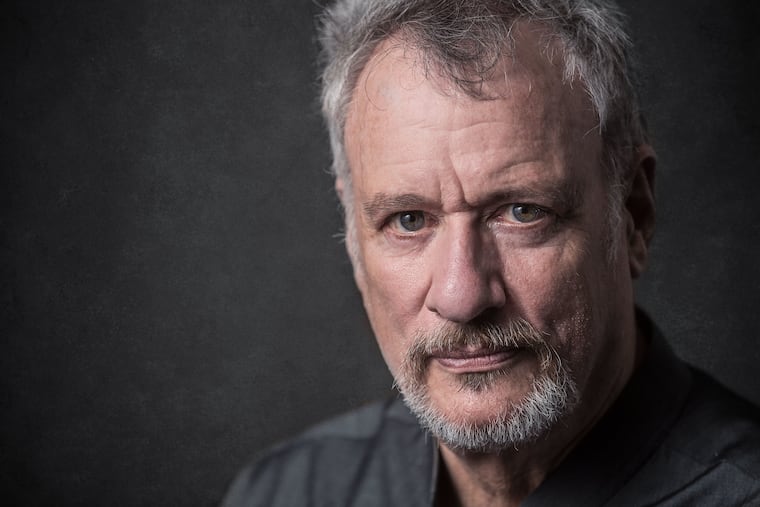John de Lancie, Star Trek and Stravinsky collide for a concert at Curtis Institute
The actor who played Q in "Star Trek" will narrate "The Soldier's Tale" with a student-alumni ensemble.

Q is coming home. The puckish, omnipotent alien returns next week to his roots — to Philadelphia, and classical music.
John de Lancie, the actor who famously played Q in Star Trek, materializes Tuesday to narrate Stravinsky’s The Soldier’s Tale with a Curtis Institute student-alumni ensemble at the Philadelphia Film Center.
In Stravinsky’s punchy, sardonic work from 1918, a soldier makes a deal with the devil by trading his violin for wealth. De Lancie will play both roles.
Why Curtis?
“Well, it’s the Curtis,” said Philadelphia-born de Lancie via Zoom last week, “and that pretty well says it all.”
Well, not quite all. For several decades in this town, the name John de Lancie meant his father, the formidable director of Curtis in the 1970s and ‘80s and, for 23 seasons, the principal oboist of the Philadelphia Orchestra.
John de Lancie the son — also known for playing Donald Margolis in Breaking Bad — still feels the connection to the elite music school on Rittenhouse Square.
“I grew up with the Curtis. I think of it very fondly, so when they came to me [with the invitation], I went, ‘Yeah, sure.’ My agents weren’t so happy.”
Not so happy because the gig was a big commitment, sending de Lancie on the road for rehearsals, and for more than two weeks of performances in eight cities across the U.S.
“You know, as an actor, you’re supposed to be forever available and not going off to do these artsy-fartsy programs.”
But de Lancie, 74, has made artsy-fartsy, aka classical music, a distinctive element in his career. He’s hosted the Los Angeles Philharmonic’s children’s concerts, and has performed Peer Gynt, a specially constructed version of Romeo and Juliet and other works with major orchestras.
He even studied oboe, briefly. After about six weeks of lessons with one of his father’s students, the elder de Lancie asked to hear his double-reed progeny play.
“And he said, “You’ll never be a musician, you should find something else to do.’”
Were his feelings hurt?
“You know, I’m sure they were somewhat hurt. But I was kind of relieved,” he said. “That part of the pie was sort of eaten up.”
Coming from Philadelphia, though, and having his father, did shape de Lancie’s career.
“If I grew up in a different environment, I probably wouldn’t be as attracted to or as familiar with [classical music]. As a little kid I went to the Academy of Music constantly. And I listened to it, I daresay, as most people listen.”
That is, he remembers finding some of the pieces interesting, others less so.
“And some of them you listen to closely and you go, ‘Oh, my gosh.’ I remember as a little boy, 10 or 11 years old, crying during the Berlioz Harold in Italy, the slow movement. I just was overwhelmed by it. But there were other times you’re listening to Haydn [Symphony] number 72 or whatever it is, and I’m looking around, looking at the lights and just, you know, just daydreaming.”
Reverie won’t be an option in The Soldier’s Tale.
But listeners might let their imagination wander a bit in a new work by Nick DiBerardino. The Curtis composition professor was invited to write a piece for the same instrumental septet as the Stravinsky, and, being a Star Trek geek in good standing, he decided on giving a hat tip to de Lancie.
Darmok & Jalad takes off from DiBerardino’s favorite episode of Star Trek: The Next Generation, in which the Enterprise crew meets a a race of beings that speaks an enigmatic language based in metaphor.
“I just thought it was really interesting as an aesthetic experience, like hanging on the edge of intelligibility,” said DiBerardino. “And that’s a feeling that I personally enjoy when I’m listening to new music where it’s like, I’m grabbing bits of it, and I’m interested and I don’t fully understand it. And that’s something I wanted to lean into in my piece.”
DiBerardino said he decided to “take little chunks of classical grammar — just the most basic stuff that animates Bach, Haydn, Mozart, Beethoven and beyond through probably Mahler — and twist them, bend them just a little bit.”
De Lancie says that every night on tour he makes a point of listening to the new piece, and that it makes him smile.
“Nick has musically captured both the beauty and frustration of an alien language that can only communicate in metaphors,” wrote de Lancie in a follow-up email to the interview. “The musical dialogue is riveting. I invited two friends who know Star Trek far better than I and they were thrilled. It’s such accessible music and knowing the story behind it makes it even more special.”
The composer says that writing the new work not only gave him a chance to meet de Lancie, but also to make contact with Joe Menosky, who wrote the screenplay for the “Darmok” episode.
“This whole experience has been wild,” said DiBerardino, “because now I’m talking with John about Star Trek and about music, and I got an email from Menosky. It’s been kind of crazy to see these two nerd kingdoms uniting here.”
The Soldier’s Tale and Darmok & Jalad, plus works by Viet Cuong, Poulenc and Penderecki, are performed by Curtis students and alumni March 21 at 8 p.m. at the Philadelphia Film Center, 1412 Chestnut St. Micah Gleason conducts. Tickets, $32, at curtis.edu or 215-893-7902.